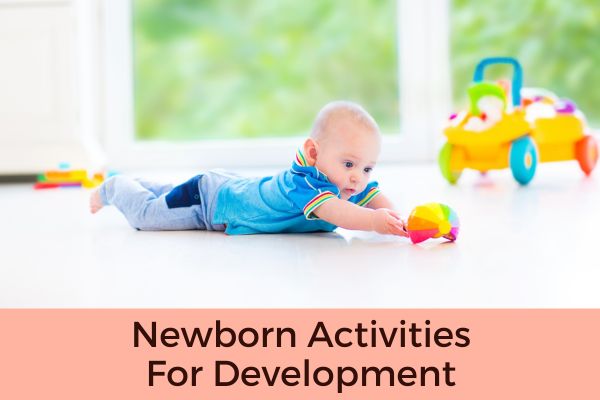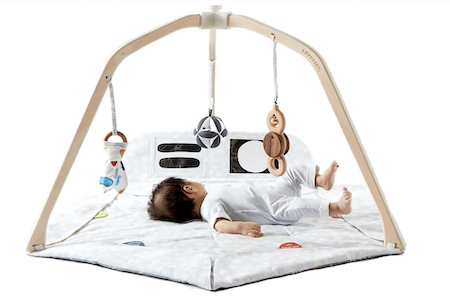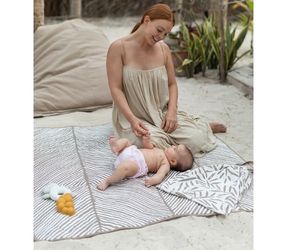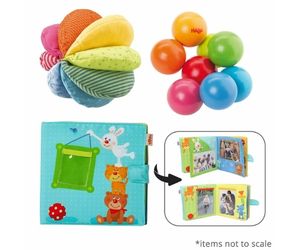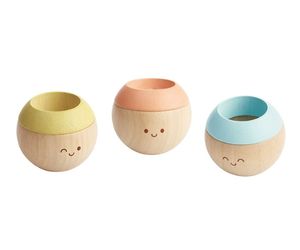Children, in general, learn a lot from playing and babies are no different.
That’s why it’s important to know a couple of newborn activities for development. These activities provide opportunities for your babies to learn and explore while playing at the same time.
But how to play with your newborn? How can you entertain your baby at home?
What are some learning activities for infants?
This article will answer that and more.
First, let’s get to the reason why you’re looking for newborn developmental activities in the first place – to meet milestones.
List of Contents
Infant Developmental Milestones
The CDC along with the AAP recently revised developmental milestones to easily detect signs of autism.
At 4 months or by the end of the newborn stage, your baby should be able to meet the following milestones:
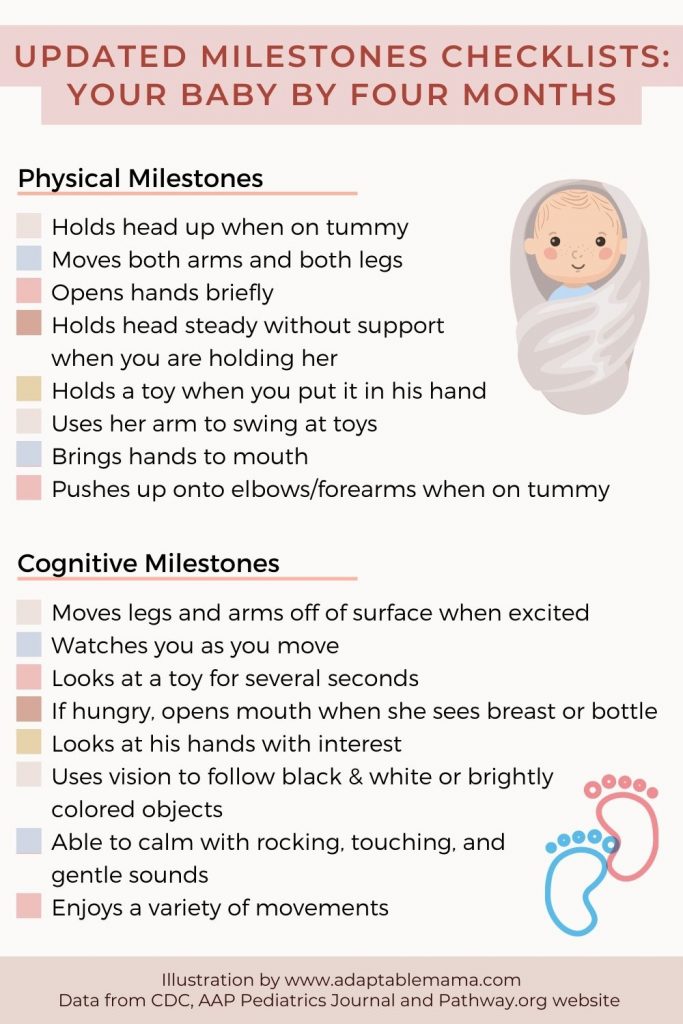

You can check the CDC’s updated milestones checklists here.
I’ve also added some pathways.org milestones checklists, which are also supported by the AAP.
Keep in mind that some babies might be more advanced and reach their milestones earlier.
Take note to consult with your doctor if you’re worried about some delayed milestones.
The next activities you’ll find here will be based on helping your newborn achieve those milestones on time.
Some of the infant development activities here have overlapping developmental benefits. They can provide several opportunities for your newborn to get and improve a variety of skills.
Let’s start with baby activities to improve physical development.
(Some of the links in this post may be affiliate links. This means if you click on the link and purchase the item, I will receive an affiliate commission at no extra cost to you. All opinions remain my own. For more information see Affiliate Policy.)
Newborn Activities For Development
Baby Activities for Physical Development
- Do tummy time activities
Tummy time is a must to help your little one develop their neck and shoulder muscles. This activity also prevents your baby’s head from developing flat spots.
Chest to chest is the best way to do it, especially in the beginning. Skin-to-skin offers a lot of bonding and soothing benefits, plus it also allows your baby to work their neck muscles.
You can make them do tummy time during diaper changes, so it will be easier for you to remember to do it. Always stay by your baby’s side, especially if they’re becoming more mobile.
Make sure to also do it an hour or less after they’ve eaten, so they don’t spit up or vomit.
If they don’t like to do tummy time, you can grab a toy, a rattle, or place high-contrast books for them to look at. This could distract and encourage them to do more tummy time.
- Reaching for toys
Babies can develop muscle strength and improve their response to visual and auditory cues by reaching, grabbing, or even kicking toys.
Encourage them to swipe and try to reach for toys by placing one in front of them during tummy time.
Or let them try to swipe or kick at a hanging toy when they’re placed on their backs.
Give them safe toys that they can easily grasp and are safe for mouthing.
- Leg cycling motions
Doing leg cycling motions can improve your baby’s flexibility and even relieve gas pain.
Do this before and/or after a diaper change, especially if they’re crying from being gassy.
Just hold on to their legs and do a gentle cycling motion. Sing to them, talk to them and make funny faces, to make a fun activity.
- Change their positions
Let your baby change positions and see things from a different perspective.
This allows them to practice and develop their motor skills and can also impact their cognitive and social development.
You can try to put them on a playmat or do supervised tummy time on the bed, on the sofa, baby lounger, or even outside.
You can also place them in a baby swing, in a baby activity gym, carry them, or put them in a baby carrier.
Doing tummy time outdoors can also be a new experience and perspective for them.
- Encourage freedom of movement
Baby gadgets such as strollers, baby swings and such have their benefits but don’t let your baby stay too long on them.
Give your baby supervised opportunities to stretch, kick and explore their environment.
You can let them go diaper-free on their playmat or playpen and see them look around the ceiling, the room, and the windows.
Do tummy time several times a day.
Let them develop their motor skills and confidence at their own pace, by encouraging them to move on their own, without any restrictions.
Infant Activities for Social-Emotional Development
- Respond to them
Face your baby and encourage him/her to make a face, a sound, or a movement by imitating them. Or you can also smile, laugh with them, make faces, and talk in an excited manner.
This way, babies learn that they can get a response from their caregiver and that their actions and sounds hold some meaning.
They learn to develop trust when their needs are met consistently.
These everyday interactions send your baby a message that can shape their self-esteem. So try to always provide responsive care.
- Do puppet play
Another way of bonding with your baby, while developing their social-emotional skills is through puppet play!
Hold a puppet, make eye contact with your newborn, and touch your baby with the puppet while talking or singing at the same time.
Wait for your little one to respond then continue doing the puppet activity.
Through this, your baby will feel safe and nurtured.
They will eventually understand that you’re interested in what they have to say. They will get that you’ll always be responsive to them when they’re communicating with you.
- Cuddle a lot
Cuddling time with your little one has a lot of psychological and physical benefits.
Cuddling can help develop a strong bond with your baby. It can also make their sleep better and can improve the regulation of their unconscious bodily processes.
- Do baby massage
Massaging your baby can bring them a lot of comfort.
It can help them relax and sleep better, it can reduce crying, and reduce gas pain.
It can also help them strengthen and regulate their primary systems. Best of all, the encourages bonding and attachment with your little one.
- Create routines
Consistent routines provide a sense of comfort and security.
It helps them learn to trust their caregivers, knowing that their needs will always be provided for.
It also makes transitions easier, as babies will eventually anticipate the action.
Routines can also help parents become less overwhelmed and feel more productive.
Check out some schedules here from stay-at-home moms to guide you in creating a routine with your newborn.
- Play simple games
Playing peekaboo, where-did-it-go and similar games with your baby can help them experience emotions such as anticipation and surprise.
It also teaches making eye contact when conversing, develops listening skills, and signals taking turns.
It can also help your little one cognitively as it helps develop object permanence.
- Dance with your baby
Gentle rhythmic movements provide a soothing stimulation to your baby. This encourages the growth of their vital neurotransmitters.
So play some music, carry your baby gently and securely, and look into their eyes while dancing, singing, and talking.
This also provides a wonderful bonding moment with your little one.
Be careful though not to spin quickly nor to overstimulate your baby.
Newborn Activities for Cognitive Development
- Practice visual attention
Use age-appropriate toys, wait for them to look at the toy, and move the toy from side to side. This can practice and improve your baby’s tracking skills.
You can also use a toy mobile on their crib or use a baby activity gym, and let your baby watch and focus on the hanging toys.
- Do some cause-and-effect activities
Use a rattle or noisemaker and shake it in front of them.
You can also use a crinkly toy and let them discover how it makes a crinkly sound.
Simple cause-and-effect toys like these can eventually help them understand the effects of their actions and how the world works around them.
- Do sensory play
There’s a close connection between cognitive development and sensory play.
The latter encourages and stimulates a child’s cognitive abilities which can lead to developing their problem-solving and critical thinking skills.
Do sensory play by letting your baby touch and play with appropriate, safe toys like softballs, textured baby books, ribbed teethers, and crinkly mats.
You can also let them use diaper time for sensory play! Let them touch a clean diaper, wet wipes, and towels.
You can also DIY some sensory toys by filling a Ziploc bag with various objects like water with pompom balls, gel with food dye, etc. Just make sure to secure the Ziploc bag with masking tape.
You can also do water play and use cups or squeeze toys and let the water run on their body.
You can also hold them and let them splash and kick some water in a shallow tray or bowl.
You can also just touch and count their toes and fingers, trace their face, tickle them a bit, and such.
Talk and describe all these activities to them to also develop their language and communication skills.
- Use a mirror
Get a small stand-alone mirror or place one along the wall and let your baby look at it.
Tap the mirror and say their name. You can also gently touch their chest after doing that.
Doing this repeatedly will make your baby understand who they are looking at in the mirror.
Newborn Activities for Language/ Communication Development
- Talk to your baby
Communicate to your little one in a high-pitched, sing-song type of voice.
Infants prefer to listen to this kind of talking (or singing) and catch their attention more.
You can just simply narrate to them simple things, like what are you making for dinner, how’s the weather, who did you see, and the likes.
Remember to pause while they’re making a sound, to seemingly make this into a conversation.
This will have long-term benefits when it comes to bonding with your child while expanding their vocabulary.
- Sing or play some music
This exposes them to new words and music and develops their listening skills.
Sing or play music during supervised tummy time or when you’re changing their diapers or when bathing them.
You can also play some lullabies or nursery rhymes while they’re on the playmat or their baby swing or bouncer.
- Read to your baby
Not only does this help with language and cognitive development, but this also encourages a love for reading. And it’s always better to start as early as possible.
Reading to newborns has a lot of long-term benefits and can also build their social and emotional skills.
You can read to your baby as a bedtime routine. Or while they’re hanging out in their crib or swing.
- Look at things
Carry your baby and walk around your house.
Point out different items, describe objects and just talk about the things that you can see.
This will make them become more aware of their surroundings and also exposes them to different words and meanings.
Indoor Activities To Do with Newborns
Let’s face it, we can’t always entertain and do activities with our baby 24/7.
Especially if you have to work and/or don’t have someone helping you with household chores.
Baby gadgets then are necessary to give you some form of rest and relief, while entertaining your baby at the same time.
With that, here are more newborn indoor activities that can mostly, amuse and engage your baby, without your help.
- Use a baby activity gym
This is your ultimate savior in entertaining and engaging your newborn. It has accessories that can help babies develop skills, to reach their milestones.
Just place them underneath the play gym, and see them swipe at the toys, feel the crinkly materials, and more.
- One of Our Top Recommendations
- Award-Winning Non Toxic Activity Gym
- Top 4 Bestseller on Amazon (as of this publishing)
- Best For Big Spaces

- Best Wooden Baby Gym For Small Spaces
- Best Baby Play Gym For Traveling
- Use a baby swing or rocker
Let your baby look at things distinctly by placing them on a baby swing or rocker.
You can make them face you while you’re working or cleaning the house.
Or if you have a large window or glass door, make them face it so they see and take in the view outside.
You can also just give them a teething toy while they’re moving in their baby swing or rocker.
Fisher-Price Sweet Snugapuppy Dreams Cradle ‘n Swing
- 2 adjustable positions
- 2 ways swing motinos
- 6 swing speeds
- Comes with rotating toys, mirror
- Multi-recline feature
- 5 ways swing motions
- 5 swing speeds
- Comes with crinkly ball, rattle, mirror
- Use a playmat
If you want them to have more freedom of movement, let them stay on a playmat.
Put them in a safe space where they can look at different, interesting things. Like in your living room, where there’s more traffic and stuff.
- Introduce age-appropriate toys
Let your babies explore a variety of toys that can help their physical and cognitive development.
You can use feet rattles and see their joy in discovering their feet!
Give them a rattle and or any cause-and-effect toys and watch them trying to work it out on their own.
Show them how a toy works and they will soon learn how to play on their own.
- Let them look at books
You can let them hold some soft baby books or prop up some board books or art cards during tummy time.
Change up their books every few weeks or so, just for variety.
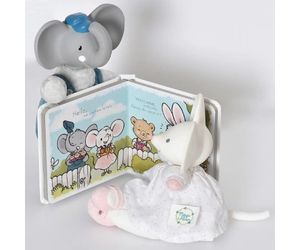
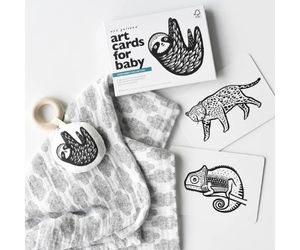
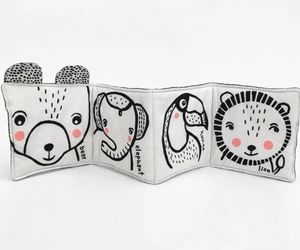
- Put up family photos
You can place a framed picture in front of them when they’re doing tummy time. Or hang pictures on their crib so they can look at them.
Place pictures of a few family members, and point out and describe them.
Then just have them look at them quietly on their own. Just make sure they can’t reach the pictures as they might start eating or destroying them!
- Do chores/ exercises in front of them
Hit two birds with one stone with this activity.
Place your baby where they can see you.
Use either a baby swing or playmat and do some light chores, like folding the laundry, organizing documents, etc., while talking to your baby.
Or do some light exercise, talk out loud – count your steps, breathe, and more.
This way, you’re being productive while engaging and teaching your baby at the same time!
Outdoor Activities To Do with Babies
- Do tummy time outdoors
Use an outdoor playpen to protect your baby from outdoor elements, such as dust, wind, and more.
If you’re in your backyard, put them down in a washable playmat and see them take in the view!
Talk to them or better yet, lie down with them and point out the trees, birds, grass, and more.
You can also blow bubbles or do water play, to make it a more interesting experience for your baby.
- Use a baby carrier
Incorporate in your routine some outdoor/ exercise time. Try walking outside or hiking with your baby.
Put them in a baby carrier and just enjoy them close while you get some breather from chores and everyday mom life.


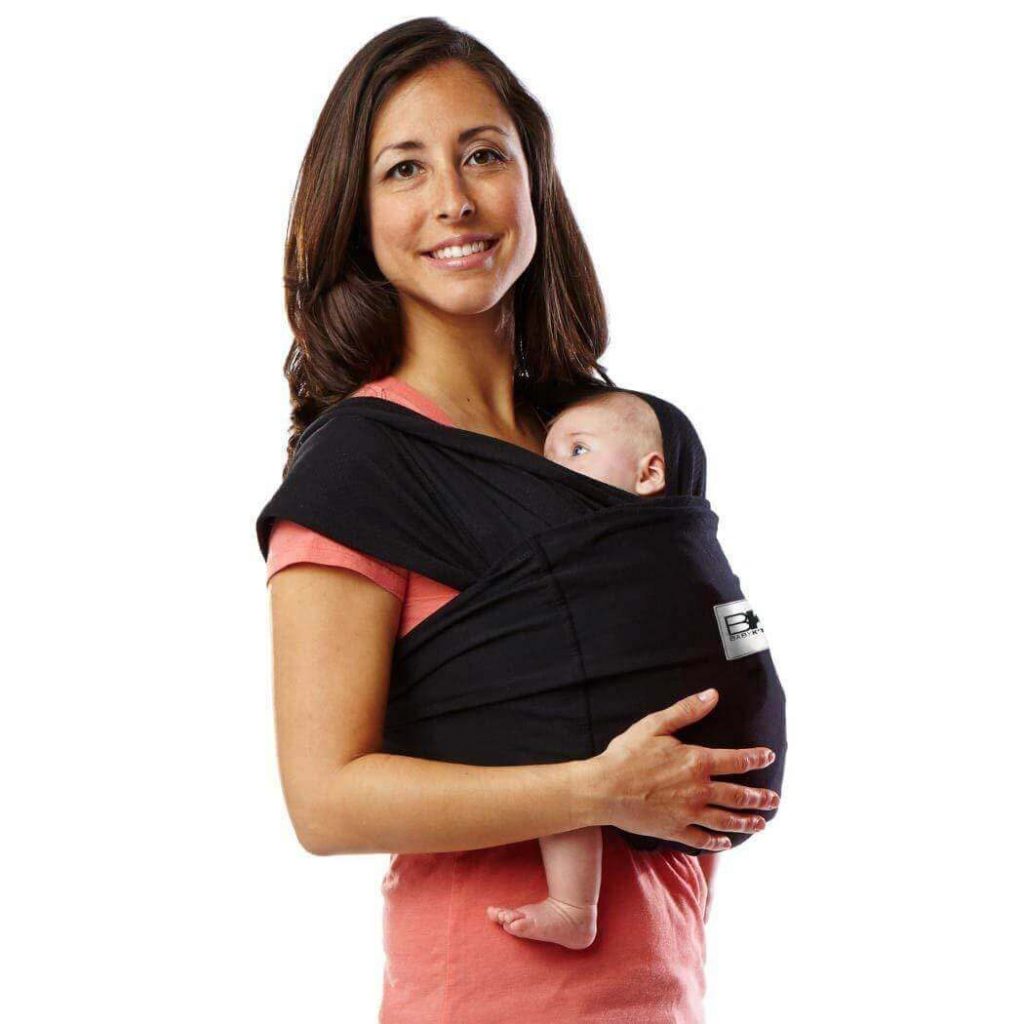
- Use a stroller
If you want to be hands-free while still enjoying a walk with your baby, put them in a stroller!
Let them watch and make sense of their environment.
Take a minute or two to get down to their level, talk to them, and ensure them that you’re always nearby.
- Run errands with them
Try to include running errands with your baby. So you’ll both get used to the experience.
This will benefit you both in the long run. You get to be productive while your child understands transitions and that it’s not always playtime.
You can do grocery shopping with them, get and deposit mail or packages, go to the bank, and more.
FAQ on Newborn Activities
What activities should I do with a newborn?
You should do a mix of activities that can help your newborn in different areas – physically, cognitively, socially, and emotionally.
Do newborns need toys?
Yes, newborns need toys. Especially if you want to develop their physical and cognitive skills.
Toys are also useful for parents, as these can give them a breather from playing with their babies.
How do I bond with my newborn?
Just the simple act of responding to their needs, cuddling, and talking to them is enough to form a bond with your newborn.
What are the main activities of a newborn’s day?
A newborn’s day involves 4 major activities – feeding, playing, cleaning (bathing, sponge bath, diaper change), and sleeping.
You can incorporate different developmental activities within those major needs, especially during playtime.
Helpful Tips in Doing Infant Developmental Activities
- Avoid overstimulating your baby
This can lead to them getting cranky and crying. Try to read their tired and sleepy cues and transition to a relaxing routine.
- Avoid exposure to different food smells
It might sound like a good idea to expose them to different smells of fruits, vegetables, and food in general.
But that could also be too much for their underdeveloped system to take.
It can also trigger an allergy, so it’s better to wait that out until they’re ready to do some baby-led weaning.
- Always use age-appropriate toys
Any toys with small, sharp objects are a no-no for babies. They can be dangerous and are potential choking hazards.
But don’t give them toys that are too heavy or big or too advanced for them.
Just stick to toys that are suitable for their age and skills initially. Then you can move on to other more fun toys as they get bigger and older.
- Don’t get too many toys
Children in general, don’t need too many toys.
Having too many can overwhelm them and lead to poor focus and concentration.
Just get your newborn 2 to 3 toys and they’ll be fine.
- Utilize baby gears
If you have the budget, go and get some!
It will help you tremendously to become a more hands-free and productive parent.
Plus it can also entertain and engage your baby.
Must-haves are playmats and baby carriers.
While those that are not exactly necessities but are great to have is a baby play gym, baby swing, and rocker.
Throw in an outdoor playpen, if you like hanging outside with your baby.
Final Thoughts on Newborn Activities For Development
It’s important to engage and teach your baby but don’t try to entertain them every waking second.
Let them be on their own at times.
Let them learn to soothe and settle themselves, play with their toys, watch things that amuse them, etc., without making it into another learning-developmental activity for them.
Remember, you need a break too.
Plus, you don’t want them getting used to you being their on-demand entertainer/ playmate.
Your baby will be fine if you don’t play with them or do newborn activities for development all the time. As long as you respond to their urgent needs, they’ll be fine.
If you’re struggling to get things done because your baby is a tad too clingy, check this article for tips and tricks.

